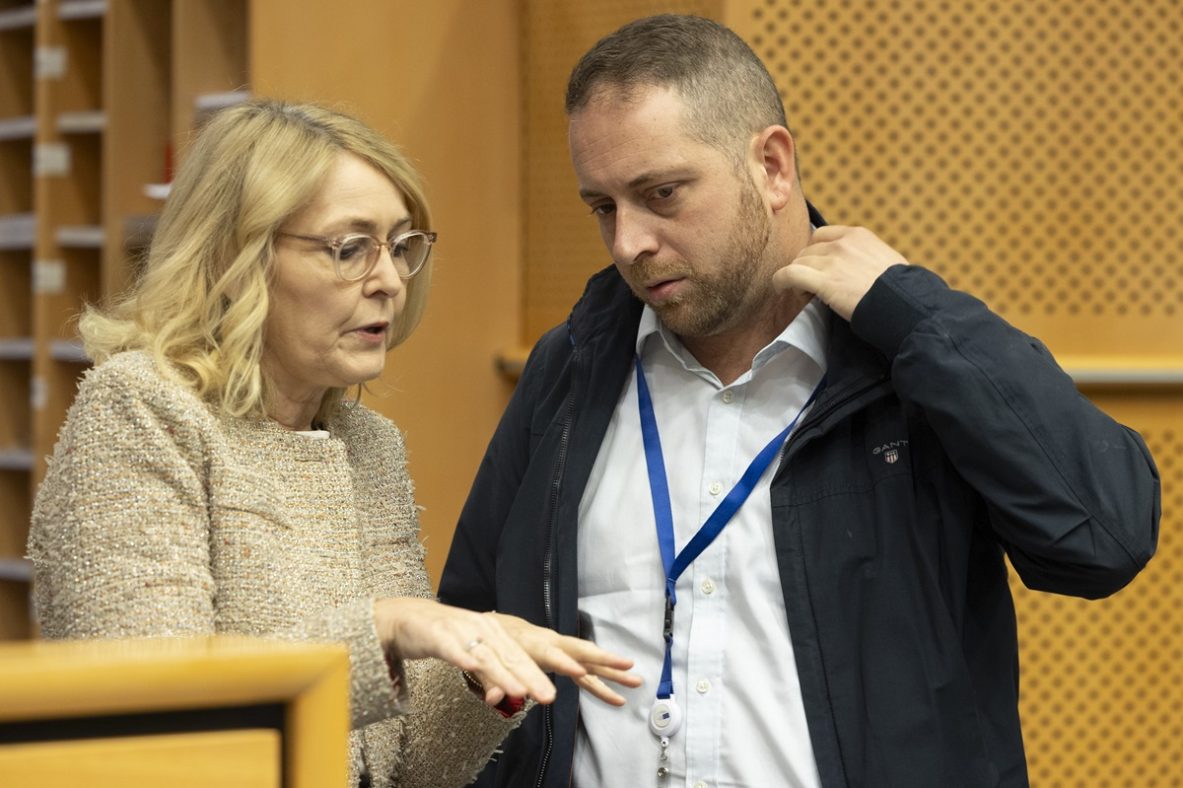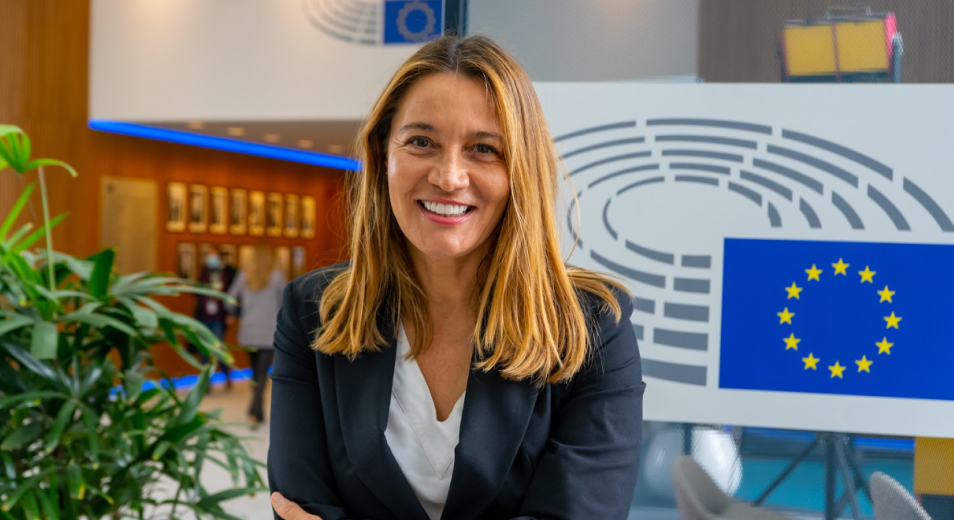Half of EU adults lack basic digital skills, a serious challenge to competitiveness
Europe’s competitiveness must start with digital skills nurtured offline from kindergarten, and deeper online rural investment

Nearly half of adults in the EU still lack basic digital skills, even though 90% of jobs now require them, a gap that threatens Europe’s competitiveness and future workforce, policymakers warned at a Euractiv virtual debate held ahead of EU Code Week.
“Digitisation and digital education are on a high level in our political agenda,” said Austrian centre-left MEP Hannes Heide, “but there is still a lot to do. We have to do not only the planning, but we have to take action.”
The European Commission estimates that 45% of adults do not have basic digital skills, a figure that Francesca Maltauro, an official in charge of digital education at the Commission, called “a major challenge to Europe’s economic competitiveness”.
Adopted in 2020 in the wake of the pandemic, the Digital Education Action Plan (2021-27) is the EU’s roadmap for improving how Europeans learn and teach in the digital age.
It aims to help countries build stronger digital education systems, from better infrastructure and teacher training to modern curricula, while giving citizens the skills they need to thrive in an increasingly technology-driven economy.
As the plan reaches its midway point, Maltauro said that “there’s still work to do concerning the development of digital capacities in the member states, in terms of infrastructure, connectivity, and also the teachers’ capabilities to teach digital skills.”
Uneven progress across regions
For MEP Heide, one of the key lessons from the pandemic is that access remains uneven. “Young people were delivered with tablets, with possibilities to work from home, to do home schooling,” he said, “but still, we don’t have enough data in many areas in the EU, such as remote areas. So, it’s not enough to provide hardware, we also have to provide the data.”
“The future of Europe is in the rural areas,” he continued. “We need targeted funding for schools in rural regions, and we have to invest in teachers, in teachers’ skills and abilities. It needs a systematic change in the educational system.”
Jan De Craemer, from the Flemish ministry of education and training, agreed that progress differs across Europe, noting that his region recently finalised a full curriculum reform embedding digital literacy from primary to secondary level.
“We now have a core component of ICT, computational thinking and media literacy,” he said.
De Craemer also highlighted Flanders’ new policy programme “fully aligned with the EU’s Digital Education Action Plan”, focusing on professional development of teachers, ICT policy plans for schools, and “a new focus on cybersecurity and safe and learning school environments and well-being.”
At the same time, he warned of a backlash: “Starting from the first of September of this school year, there is now a smartphone ban that came into place in schools [across Flanders].”
“The goal is to improve concentration and reduce distractions, but obviously it also means quite a challenge to balance between, on the one hand, introducing and experimenting with technology, and, on the other hand, the limitations that come forward from society,” he added.
10 million young people reached
Diana Filip, deputy CEO and chief development officer at JA Europe, said one of the Action Plan’s biggest successes has been “the ability to mobilise a community”.
“In just one year, we reached and impacted over ten million young people,” she said. “That is a powerful reminder that digital education is not only about skills and about participation: it’s about confidence and empowerment.”
Filip stressed that opportunities to learn digital skills “are still unevenly distributed between countries, between regions, between schools and different social groups,” and that “too many young people are at risk of being left behind at the time when digital competence is not optional but essential for the future”.
Arja Krauchenberg, project coordinator at the European Parents Association, reminded participants that families must not be forgotten in this transition.
Krauchenberg warned that “leaving children in there without guardrails, without any borders, can have very detrimental effects,” calling for “cooperation between all the stakeholders”.
“Nobody will be able to do this on his or her own,” she said. “We cannot leave it just to the teachers in school or just to policymakers … we really have to work all together in order to make it possible that all children, but not only children and young people, but all citizens, are equipped with the necessary skills that the digital future requires.”
She also encouraged “unplugged activities” that teach logic and problem-solving without screens.
“Computational thinking, pattern recognition and all the digital skills that you need start with unplugged activities,” she explained. “They can be done in kindergartens, in primary schools, and they can be done at home, things that parents can do together with their children.”
Bridging the gender gap
The speakers also warned that the gender divide in digital and STEM fields remains deep.
“There are still barriers that prevent girls, especially as of a certain age, to choose studies or later on a career in digital or STEM fields,” said the Commission’s Maltauro.
JA Europe’s Filip agreed, sharing that when girls are given the chance, they excel. “When you give them the opportunity to try things, to be exposed to something, they do it,” she said. “We need to give them that platform, that framework to try, and they are so creative.”
De Craemer added that structural change is needed. “Sometimes I think that we have tried too much to convince girls to choose STEM careers,” he said, “and by doing so, we tried to change the girls and not change the system.”
Krauchenberg pointed out that gender stereotypes start early. “Girls, or children who are confronted with those stereotypes at an early age, already have a very fixed mind of what girls are supposed to do or not to do by the time they get to school,” she said. “We really need to work more on this in the early childhood education sector, not only with the nurseries and the kindergartens, but specifically with the families.”
A Union of Skills
Looking ahead, Maltauro said the Commission’s new Union of Skills strategy, introduced in March this year, aims to ensure “that everyone in Europe is empowered to build solid skills foundations.”
Digital well-being, she added, will be a new priority: “We need to have this culture of thinking about well-being in this way. We cannot just disconnect and pretend that the entire online world does not exist.”
Heide urged policymakers to use the current momentum. “Young people themselves want to learn and develop digital skills,” he said. “Use it as an opportunity.”
For De Craemer, the next step is to consolidate progress. “After COVID, we made considerable progress with digital education policies,” he said. “Now the main challenge is to consolidate on that basis.”
This article follows the policy debate “Code to competitiveness – How can digital skills power Europe’s future?” supported by CODE4EUROPE.
(BM)








